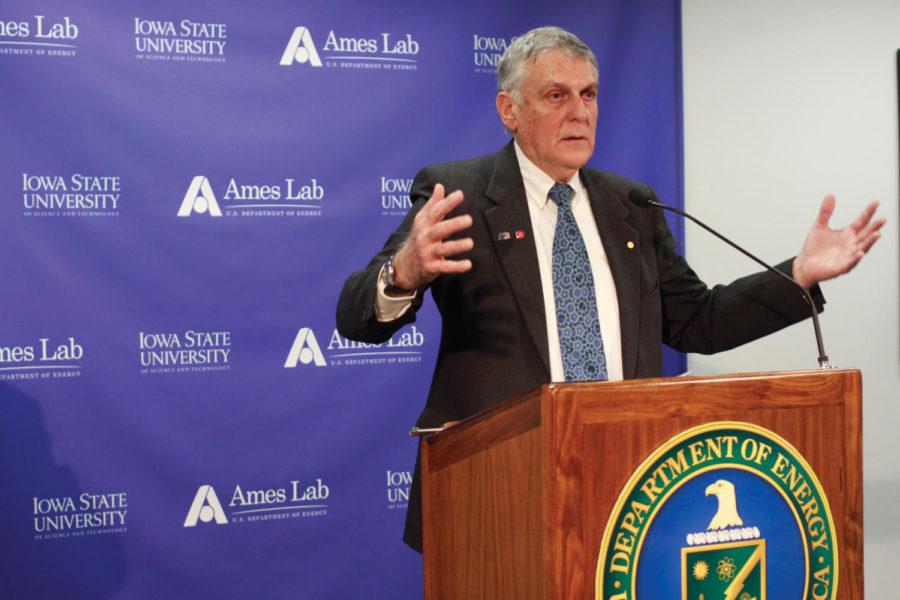Shechtman shares experience as Nobel Prize winner
Dan Shechtman, Nobel Prize laureate and ISU professor of materials science and engineering, speaks during a news conference Tuesday, Feb. 14, at the technical and administrative services facility. Shechtman talked about how his life has changed after receiving the Nobel Prize in 2011.
February 14, 2012
Everyone has a bad morning once in a while. Whether it includes oversleeping, a stubbed toe, a bad hair day or a late arrival, some starts are simply better than others. Dan Shechtman, a scientist at U.S. Department of Energy’s Ames Laboratory and professor of materials science and engineering, is no exception.
Shechtman’s day on Oct. 5, 2011, did not start out well. His 21-year-old car would not start, so he was forced to take his wife’s car to work at his job at Technion-Israel Institute of Technology. But at 11:50 a.m., his day took a turn. He received a call from Sweden and was told that he was the single candidate for the 2011 Nobel Prize in chemistry for his discovery of quasicrystals. He was told not to share the news with anyone for 30 minutes because the Nobel Foundation had not yet announced it to the world. He shared it with his wife, Tzipora Shechtman, first.
“I was sitting alone in my office for my last five minutes of freedom,” Shechtman said. “I was thinking, ‘What does this mean? What will happen now?’”
The Nobel laureate had dozens of Iowa State’s leaders and media personnel laughing as he explained his Nobel Prize experiences at a news conference Tuesday morning.
ISU President Steven Leath began the conference by extending the congratulations of Iowa State’s principals, faculty and students to Shechtman.
The director of the Ames Laboratory, Alex King, also spoke about the honor that Shechtman has brought to both the institution of Iowa State and Ames Lab.
“I’d say I’m just about bursting with pride,” King said.
After making phase-changing references as an analogy for the new condition of his life, Shechtman went into detail more about what it was like to be recognized. He explained that when everyone heard the news, the hallway outside of his office felt like the entrance to a football or soccer game and how he was whisked into a news conference where the entire building was standing and cheering for him. Shechtman even had his own way of addressing the media that bombarded him.
“I’m a technical professor,” Shechtman said, addressing the reporters. “And in my class we speak one at a time.”
His sensibility continued into the Nobel week that included the Nobel Ceremony and several very festive dinners. For one of the dinners, he sat with the queen of Sweden, Queen Silvia, to his left and the king of Sweden, King Carl XVI Gustaf, seated across the table.
“All I was interested in was, ‘What does the queen do?’” Shechtman said. He received his answer at the dinner.
The Tel Aviv-born scientist was awarded the Nobel Prize for Chemistry on Dec. 10 in Stockholm, Sweden, in front of about 1,300 guests, 16 of whom were his friends and family. The award is the highest distinction for a scientist and is worth about $1.5 million. In addition, Shechtman receives countless requests to speak at institutions around the world.
“Overall, this has been a moving time for Tzipora and I,” Shechtman said. “Now I will go to many places in the world and give lectures.”

















